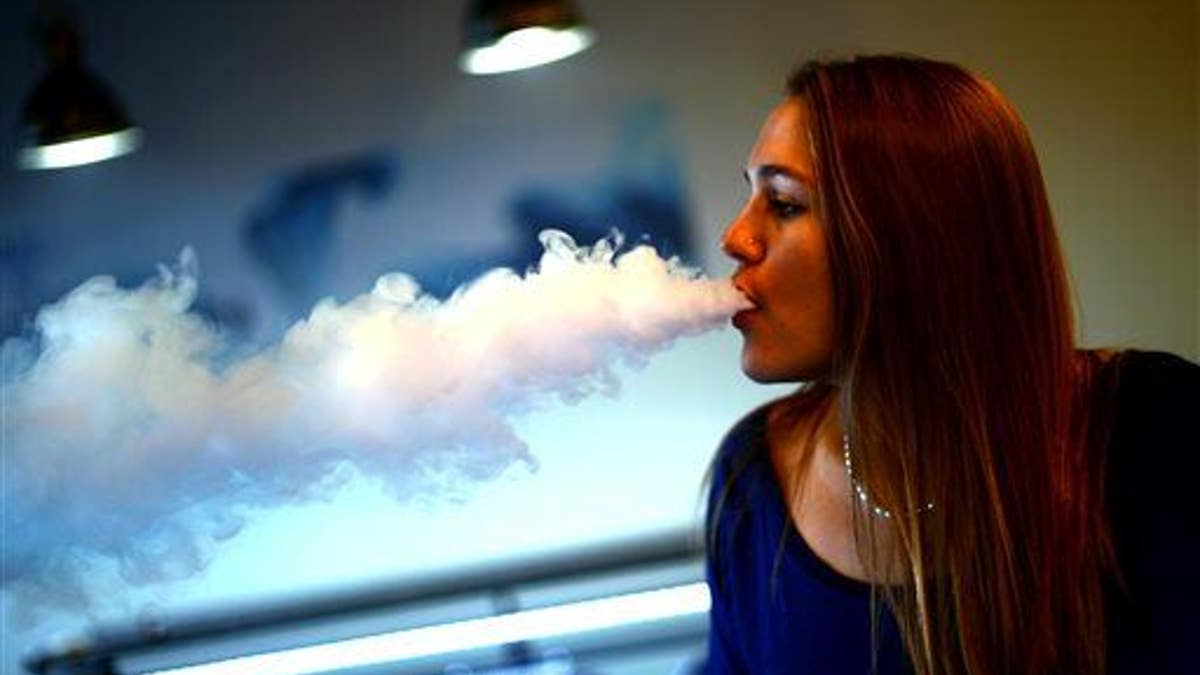
This Nov. 26, 2013 photo shows Steffani Leifeld exhaling a vapor at the Smokeless Smoking electronic cigarette store in Woodbury, Minn. (AP Photo/St. Paul Pioneer Press, Chris Polydoroff)
Even though it's illegal for teens to buy cigarettes in the U.S., nothing stops online stores from selling nicotine-infused liquids for kids to use with electronic cigarettes.
Big tobacco companies, including Altria Group Inc, Lorillard Tobacco Co and Reynolds American Inc, are all developing e-cigarettes. The battery-powered devices feature a glowing tip and a heating element that turns liquid nicotine and other flavorings into a cloud of vapor that users inhale.
When researchers tested a random selection of 120 popular e-cigarette websites, only four virtual stores prevented the sale of e-liquids to minors, the study found.
"At this time, the liquid nicotine and electronic cigarette market in the United States is largely unregulated, which we believe to be a large factor behind so few vendors implementing effective restrictions on youth access," said lead study author Dmitriy Nikitin, a researcher at the University of California, Irvine.
About 2 million middle- and high-school students tried e-cigarettes in 2014, triple the number of teen users in 2013, the Centers for Disease Control and Prevention reported last year.
Adolescents who try e-cigarettes may be more than twice as likely to move on to smoking conventional cigarettes as those who have never tried the devices, previous research has found.
For the current study, Nikitin and colleagues asked shoppers who were 16 or 17 years old to use their own debit cards to attempt online e-liquid purchases in July 2015.
The youth successfully completed purchases from vendors in 34 states, with an average order cost of $13.16.
Three of the four vendors that rejected purchases used age-verification software during the transaction and found the teens too young to buy e-liquid. One vendor asked a minor to upload an image of her government-issued photo identification and rejected the order because the ID showed she was underage.
Even though nearly all of the sites sold to minors, 88 percent of the products arrived in child-resistant packaging and slightly more than half of the containers had sealed tops that required users to squeeze the bottles to extract liquid nicotine.
Overall, about 90 percent of the bottles noted that they contained nicotine, but only 54 percent made any mention of health risks associated with nicotine use.
Many of the orders came with free samples of e-liquid, and 15 orders arrived with promotional materials including playing cards, Mike and Ike candy, Laffy Taffy candy, Sweet Tarts candy, bracelets, B'loonies Plastic Balloons and stickers.
The study didn't examine purchases of pre-filled cartridges of liquid nicotine or e-cigarette devices, but previous research has found that teens find it just as easy to buy these items online, the authors note in the journal Nicotine and Tobacco Research.
One limitation of the analysis, the researchers note, is that it didn't examine e-liquid sellers who operate on social networks like Facebook, and Reddit, which may have led them to underestimate the ease of online purchasing.
Many U.S. states already ban sales of e-cigarettes to minors, but vendors need clear guidelines to follow for preventing underage purchases to make these policies more effective, said Adam Leventhal, director of the University of Southern California Health, Emotion and Addiction Laboratory in Los Angeles.
Because kids can drink e-liquid, these products pose unique dangers to children that don't exist with traditional cigarettes, Leventhal, who wasn't involved in the study, added by email.
"In addition to the health hazards of vaping nicotine, other forms of nicotine ingestion like swallowing can be deadly," Leventhal said. "The high concentration of nicotine in some e-liquids if swallowed or absorbed into the body through other means is toxic, especially for infants and toddlers, who may be the siblings of older children who might be purchasing e-liquids and not aware of such hazards."
